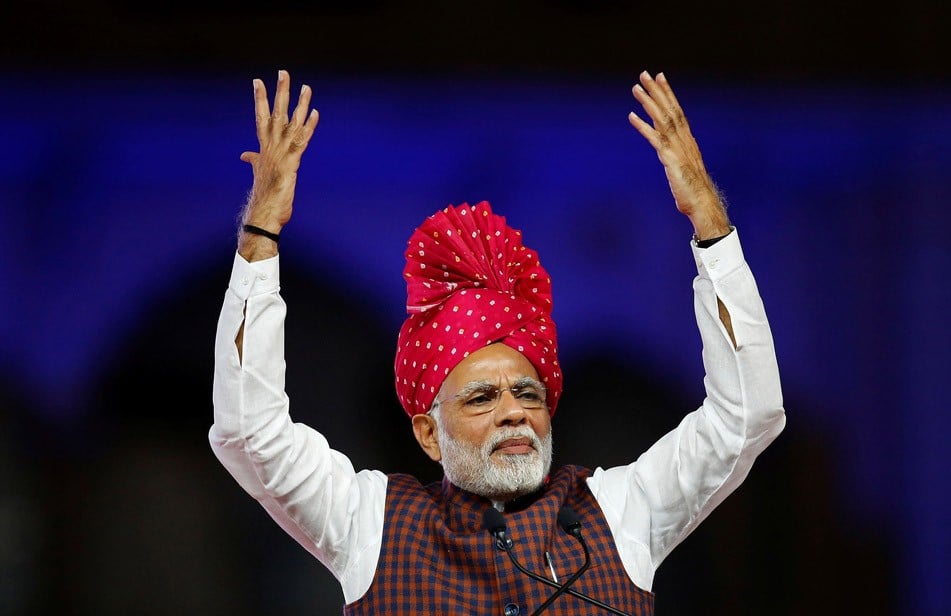

The largest democracy on planet Earth faltered badly when it chose Narendra Modi as its Prime Minister in 2014. It may seem like a sweeping statement, but a careful analysis of the way India’s politics has unfolded leads us to draw such a conclusion.
After 67 years of their engagement with democracy, Indians got to elect a demagogue, whose political mantra was exactly the opposite of what Nehru had envisaged and stood for -- plural, inclusive, democratic and secular India. This vision for a country, that was the most difficult to govern, given its size, scale of poverty and social stratification, was the best suited though extremely difficult to realise into actuality. Caste and communalism were constant irritants keeping the political situation on the boil. Those were factors for which even a person like Nehru had no cure, despite his proverbial sagacity and extraordinary foresight embedded in his profound understanding of history.
One must admit he kept trying, though with limited measure of success. Reading all that he wrote, one cannot doubt the intentions of the man. Describing India as a land epitomising ‘unity in diversity’ speaks volumes about his politics of inclusivity. In politics, like in other realms too, greatness is not usually measured by success but by the very aims and objectives, ways and methods that are devised to achieve them. Therefore, despite many flaws and failures, the objectively drawn conclusion from a neutral vantage point, Nehru was a great visionary and a statesman.
But the aim of this column is to get an overview of the Indian polity’s descent -- from Nehru’s vision to Modi’s pedestrian politics. This descent that Indian polity has experienced over decades throws up several questions of serious nature with respect to India’s democratic experience. Despite his being complicit in a large-scale massacre at Godra (in Gujarat state where Modi was the Chief Minister) in 2002, Modi still managed to find his way up to be the prime minister of ‘the largest democracy of the world’. Isn’t it a unique feature of Indian polity where such characters are elevated to the top-slot?
India has had an unbroken run with democracy. The presumption is that uninterrupted democracy inculcates political consciousness among masses, and makes them a better judge of individuals. Even a cursory glance on the political history of India provides us with enough reason to call this presumption into question. The continuity of democratic process doesn’t seem to have brought political consciousness among the electorate, which has lauded Hindutva as their ideology and Rashtriya Swayamsevak Sangh (RSS) as their political vanguard.
It is pertinent to give a brief introduction of that organisation for better understanding of how democracy in India has helped an exclusionary, xenophobic and monolithic ideology to superimpose itself on what is demographically the most diverse country in the world.
RSS is an Indian right-wing, Hindu nationalist, paramilitary volunteer organisation, also the precursor of the ruling party of India, the Bharatiya Janata Party (BJP). RSS is one of the principal organisations of the Sangh Parivar group (The Sangh Parivar can be translated as Family of Organisations. It primarily refers to the family of Hindu nationalist organisations which were started by members of the RSS or drew inspiration from its ideology. The Sangh Parivar represents the Hindu nationalist movement). Founded on September 27, 1925, RSS claimed a commitment to selfless service to India. Keshav Baliram Hedgewar, a doctor by profession but a Hindu zealot from Nagpur, was its founder. Hedgewar was a political protege of B.S. Moonje, a Tilakite Congressman, Hindu Mahasabha politician and social activist. The organisation boasts to be the world’s largest voluntary missionary organisation.
It sought to provide character training through Hindu discipline and to unite the Hindu community to form a Hindu Rashtra (Hindu nation). The organisation upholds the ideals of Indian culture, values of a civil society and propagates the ideology of Hindutva, to "strengthen" the majority Hindu community. It drew initial inspiration from European right-wing groups during World War II. In other words, it was inspired from the ideology of fascism and modelled itself on the pattern of the fascist party in Italy during the 1930s.
Gradually, RSS grew big and set up schools, charities and clubs. It is said to have been banned once during the British rule, and then thrice by the post-independence Indian government -- first in 1948 when a former RSS member (Nathuram Godse) assassinated M.K. Gandhi, then during the emergency (1975-77) imposed by Indira Gandhi; and for a third time after the demolition of Babri Masjid in 1992, an incident that had perpetuated communal fissure in India.
Also read: Indian democracy gone astray -- II
Modi epitomises the political ideology of RSS, which runs counter to the vision of India’s founding fathers. The curiosity is bound to emanate in skeptical minds if, despite India’s uninterrupted tryst with democracy, the electorate chooses a bunch of jingoistic souls, professing an ideology that negates the essential postulates on which the current state of India was founded in 1947.
Can we argue that when a democracy is subjected to unbridled capitalist interests, as it has happened in India after the 1992 financial reforms, it is bound to lead to such socio-political dichotomy? A subsidiary question can be about the capitalist interest which can lure the masses through various means to vote such people into power that prove inimical to the interests of the lower strata. Then democracy gives way to plutocracy, and that has exactly what has happened in the world’s largest democracy. RSS-controlled BJP in cahoots with Ambanis, Bajajs and Tatas have seized India into their tentacles. Nehru’s dream of making India into a social democracy has gone sour.
(to be concluded)